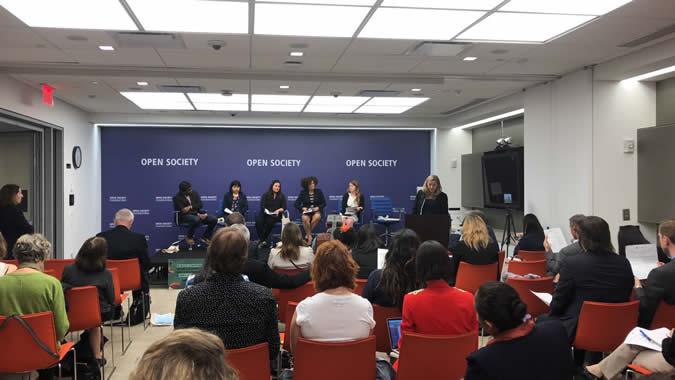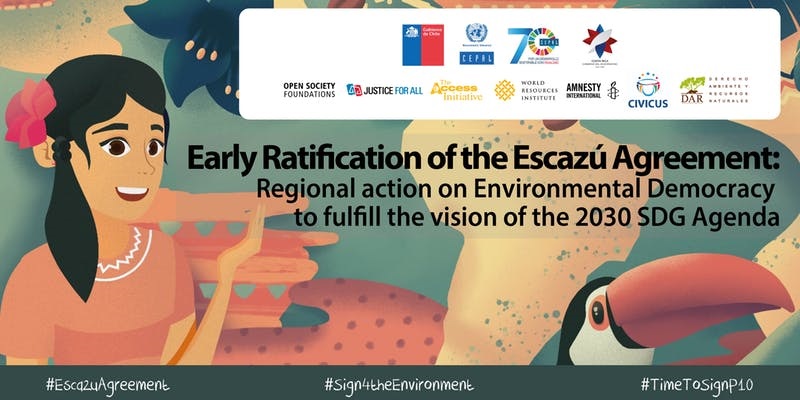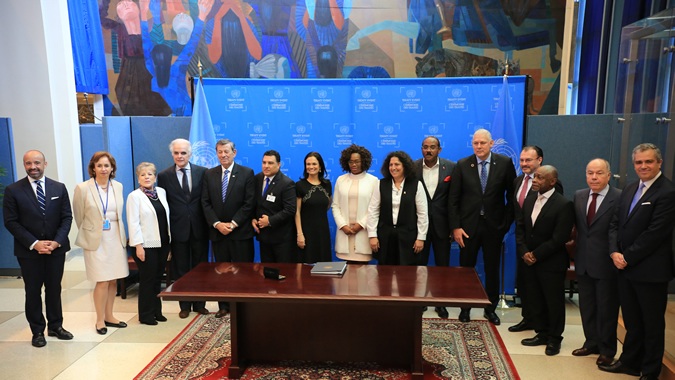Authorities, Experts and Members of Civil Society Underscore the Importance of Promptly Ratifying the Escazú Agreement
Work area(s)
An event held at the Open Society Foundation in New York brought together various stakeholders who have participated in the process of this treaty, which was already signed by 14 countries of the region today at UN headquarters.

Government authorities, international experts and representatives of non-governmental organizations and other institutions related to environmental protection, sustainable development and the defense of human rights in Latin America and the Caribbean, met today at the Open Society Foundation’s main office in New York to debate the importance of States’ prompt ratification of the Escazú Agreement, which seeks to promote access to information, public participation and justice in environmental matters.
The treaty – which was opened to the signature of countries today in the framework of the United Nations General Assembly, and was signed already by 14 countries of the region – is the first environmental agreement by and for Latin America and the Caribbean. Its entry into force requires the ratification of at least 11 States parties, a process that can be carried out in each country within a two-year timeframe, starting today.
The event entitled Early Ratification of the Escazú Agreement: Regional Action on Environmental Democracy to Fulfill the Vision of the 2030 SDG Agenda drew the special participation of Epsy Campbell Barr, Vice President and Minister of Foreign Affairs of Costa Rica; Patrick Gaspard, President of Open Society Foundation; and Alicia Bárcena, Executive Secretary of the Economic Commission for Latin America and the Caribbean (ECLAC), the organization that holds the Agreement’s Technical Secretariat.
Other speakers included Dhananjayan Sriskandarajah, Secretary General of CIVICUS; Carole Excell, Acting Director of The Access Initiative - World Resources Institute; Erika Guevara Rosas, Americas Regional Director at Amnesty International; Stacey Cram, Policy Director at Namati; and Aída Gamboa, representative of the organization Derecho, Ambiente y Recursos Naturales (DAR).
Further presenters included Danielle Andrade and Andrea Sanhueza, representatives of the public; Lizardo Cauper, of the Asociación Interétnica de Desarrollo de la Selva Peruana (AIDESEP); Satya Tripathi, Assistant Secretary-General of the United Nations and Head of the New York Office at UN Environment; and Ambassador Jose Antônio Marcondes de Carvalho, Under Secretary-General of Environment, Energy, Science and Technology of Brazil, among other prominent figures.
On the event’s various panels, participants highlighted the fact that the Escazú Agreement galvanizes the work of civil society in defense of our environment and becomes a tool for rights that protects biodiversity, the land and people whose voices are not heard, especially indigenous peoples and the most vulnerable groups.
They also recalled that Latin America and the Caribbean has the lamentable record of accounting for 60 percent of murders of environmental defenders worldwide. For that reason, they stressed that this agreement must be implemented firmly, so that it is not violated due to impunity as has happened with other international legal instruments.
Furthermore, they recognized the important work carried out by ECLAC as the Technical Secretariat of the agreement, and especially by Executive Secretary Alicia Bárcena, which has led to its adoption, signature and hopefully prompt ratification by the region’s countries.
At the event, Costa Rica’s Vice President Epsy Campbell reiterated that the Escazú Agreement is a great contribution by the region to global multilateralism and constitutes an enormous step forward for making environmental democracy a reality.
“Democracy not only has to do with participation, it also relates to what we do with our resources, how we envision ourselves in the future. I invite those countries that have not signed the agreement yet to do so in the shortest timeframe possible, so that it goes into force very soon and becomes an example of democracy in the region,” she added.
Finally, in her remarks at the conclusion of the event, ECLAC’s Executive Secretary Alicia Bárcena recalled that the Escazú Agreement is the remarkable result of an intergovernmental process with significant public participation that began at the 2012 Rio+20 UN Conference on Sustainable Development, and was achieved after nine meetings of its negotiating committee, convened since 2014 and led by Chile and Costa Rica. “Its main beneficiaries are the people of our region and the most vulnerable groups and communities,” she stated.
“This Regional Agreement is reflective of Latin America and the Caribbean’s priorities and main concerns: it sets regional standards, affirming the value of the regional dimension of multilateralism for sustainable development, fosters capacity-building and regional cooperation, lays the foundations of a supporting institutional architecture and offers tools for improved policy- and decision-making,” she explained.
“Today we begin a new chapter in this story. The strong regional commitment to environmental protection and human rights must lead to the Regional Agreement’s prompt ratification and entry into force. We need for 11 States to ratify it. Let me congratulate the first 14 countries that have already signed the agreement today at UN headquarters,” said Bárcena, adding that in this new stage it is necessary to ensure that the Escazú Agreement becomes a powerful tool to empower our people to address environmental matters and build peaceful and sustainable societies. “This new stage requires the ratification and implementation of the Agreement,” she emphasized.
Related content

Early Ratification of the Escazú Agreement: Regional action on Environmental Democracy to fulfill the vision of the 2030 SDG Agenda
Organized by UN ECLAC, the Governments of Costa Rica and Chile and the organizations The Access Initiative, Open Society Foundation, Namati, World Resources Institute, Amnesty International, Civicus…

Fourteen Countries Sign New Generation Agreement at UN Headquarters on Access to Information, Public Participation and Justice in Environmental Matters
The “Escazú Agreement” was opened for signing by Latin American and Caribbean States in a ceremony held in the context of the UN General Assembly in New York.
Type
Country(ies)
- Latin America and the Caribbean
Contact
Public Information Unit
- prensa@cepal.org
- (56 2) 2210 2040